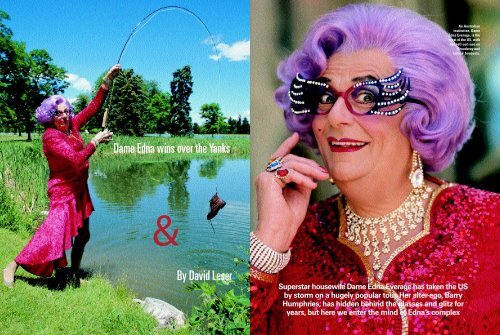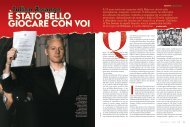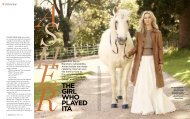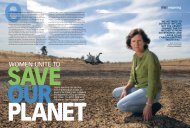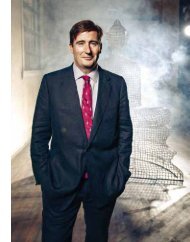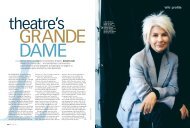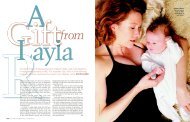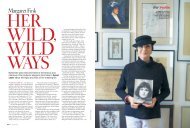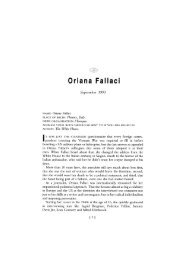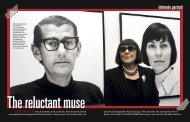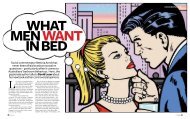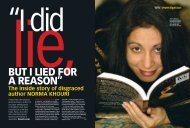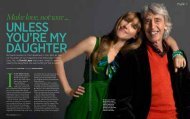Superstar housewife Dame Edna Everage has taken the - David Leser
Superstar housewife Dame Edna Everage has taken the - David Leser
Superstar housewife Dame Edna Everage has taken the - David Leser
You also want an ePaper? Increase the reach of your titles
YUMPU automatically turns print PDFs into web optimized ePapers that Google loves.
<strong>Dame</strong> <strong>Edna</strong> wins over <strong>the</strong> Yanks<br />
&<br />
By <strong>David</strong> <strong>Leser</strong><br />
An Australian<br />
institution, <strong>Dame</strong><br />
<strong>Edna</strong> <strong>Everage</strong>, is <strong>the</strong><br />
toast of <strong>the</strong> US, with<br />
her sell-out runs on<br />
Broadway and<br />
critics’ bouquets.<br />
<strong>Superstar</strong> <strong>housewife</strong> <strong>Dame</strong> <strong>Edna</strong> <strong>Everage</strong> <strong>has</strong> <strong>taken</strong> <strong>the</strong> US<br />
by storm on a hugely popular tour. Her alter-ego, Barry<br />
Humphries, <strong>has</strong> hidden behind <strong>the</strong> glasses and glitz for<br />
years, but here we enter <strong>the</strong> mind of <strong>Edna</strong>’s complex
enver, Colorado, is <strong>the</strong><br />
“Queen of <strong>the</strong> Plains”, <strong>the</strong><br />
largest city in a 1000 square<br />
kilometre area. For more<br />
than 125 years, it <strong>has</strong> been<br />
<strong>the</strong> cultural and entertainment<br />
capital of a vast region<br />
once known as <strong>the</strong> Wild West.<br />
It prides itself on its contradictions: part sleepy<br />
cow-town, part chic urban enclave.<br />
Never before, though, <strong>has</strong> it witnessed<br />
anything quite like <strong>Dame</strong> <strong>Edna</strong> <strong>Everage</strong>.<br />
On a nor<strong>the</strong>rn summer’s night recently,<br />
Australia’s most celebrated woman, <strong>the</strong><br />
megastar from Moonee Ponds, <strong>the</strong> woman<br />
who once said that her interior decorator<br />
and gynaecologist were one and <strong>the</strong> same<br />
person, flounced on to <strong>the</strong> stage of <strong>the</strong> Denver<br />
Auditorium Theatre and slayed <strong>the</strong>m in <strong>the</strong><br />
aisles.<br />
“It really is me tonight,” she declared<br />
in her trademark piercing falsetto. “In<br />
person. In <strong>the</strong> flesh ... I’m not a clone.<br />
I’m not a look-alike. I’m not genetically modified.<br />
I’m real ... and in your face!”<br />
And so she was – in a shocking pink<br />
and black sequined dress, behind enormous<br />
harlequin glasses, under a bluff of wisteria hair<br />
– for <strong>the</strong> next two-and-a-half irreverent, malicious,<br />
uproarious hours.<br />
“I’m a little bit nervous tonight,” she confided.<br />
“Isn’t it silly? <strong>Edna</strong> nervous ... I’m more<br />
nervous tonight in this little tucked-away<br />
auditorium than I would be on <strong>the</strong> stage of a<br />
Broadway <strong>the</strong>atre ... (pause) ... in front of nicely<br />
dressed people!” (Bang. First blow.)<br />
And <strong>the</strong>n looking up towards <strong>the</strong><br />
mezzanine level: “Goodness knows what <strong>the</strong><br />
paupers are wearing up <strong>the</strong>re. Probably trash<br />
bags with holes in <strong>the</strong>m ... Hello paupies, hello<br />
... Listen to <strong>the</strong>ir wistful cries. I will glance up<br />
38 THE AUSTRALIAN WOMEN’S WEEKLY – OCTOBER 2001<br />
at you from time to time. I will. I will ... (pause<br />
again) ... In strict proportion to <strong>the</strong> amount<br />
you’ve paid!” (Bang. Second blow.)<br />
The people in front of me are already shaking<br />
<strong>the</strong>ir heads in disbelief, while <strong>the</strong> woman<br />
behind is squealing with laughter, and an old<br />
man across <strong>the</strong> aisle is nodding vigorously into<br />
his breathing apparatus.<br />
“I’m interested in <strong>the</strong> demographics of my<br />
audience,” <strong>Edna</strong> continues. “Who paid me <strong>the</strong><br />
supreme complement of getting a baby sitter<br />
tonight?” A man from eight rows back volunteers<br />
Anne, <strong>the</strong> woman sitting next to him. Bad<br />
move.<br />
“How many kiddies?”<br />
“Two.”<br />
“Two? What are <strong>the</strong>ir names, Anne?”<br />
“Rick and Rachel.”<br />
“Pardon?”<br />
“Rick and Rachel!”<br />
“Don’t snap at me Anne! Who’s looking after<br />
<strong>the</strong>m tonight, Anne?”<br />
“A nanny.”<br />
“A nanny? Does she live in with you, does<br />
she Anne?”<br />
“It’s a he.”<br />
“A he! What a modern little possum<br />
you are! (Gales of laughter.) A he with<br />
nurturing skills.<br />
“Is your husband <strong>the</strong>re with you, Anne?”<br />
“Um ... ah ... no.”<br />
“Where is he?”<br />
“At <strong>the</strong> o<strong>the</strong>r house.”<br />
“At <strong>the</strong> o<strong>the</strong>r house? Oh dear. We’ve<br />
stumbled upon a dysfunctional family<br />
(more laughter) ... Two houses are <strong>the</strong>re?<br />
I bet you got <strong>the</strong> bigger one, did you ... ?”<br />
(Uproar.)<br />
Nearly a quarter of a century after<br />
conspicuously failing to crack <strong>the</strong> US scene,<br />
<strong>Dame</strong> <strong>Edna</strong> <strong>Everage</strong>, <strong>the</strong> self-styled “(prob-<br />
Left: <strong>Dame</strong> <strong>Edna</strong> gets <strong>the</strong> star treatment<br />
in Denver. Above: <strong>Edna</strong> with two of <strong>the</strong><br />
<strong>Edna</strong>ettes, her US tour dance troupe.<br />
ably Jewish) <strong>housewife</strong>, talk-show host, social<br />
anthropologist, humanitarian, investigative<br />
journalist, swami, children’s book illustrator,<br />
spin doctor and icon”, <strong>has</strong> finally made it with<br />
her “royal tour” of <strong>the</strong> US.<br />
Beginning in San Francisco three years<br />
ago, she <strong>the</strong>n moved onto Broadway a<br />
year later. There, she played for nine sellout<br />
months and won every major critics’<br />
award in <strong>the</strong> city, including <strong>the</strong> prestigious<br />
Tony (never mind that <strong>the</strong>y couldn’t decide<br />
which category to put her in. Musical<br />
or play? Best actor or best actress?) <strong>Edna</strong> <strong>has</strong><br />
since been crisscrossing <strong>the</strong> country, playing<br />
eight shows a week to packed houses in 15<br />
major cities. She <strong>has</strong> been lionised in <strong>the</strong> New<br />
Yorker magazine as a “sublime comic creation”,<br />
embraced as an agony aunt by <strong>the</strong> equally prestigious<br />
Vanity Fair magazine, and even been<br />
suggested for <strong>the</strong> presidency of Harvard by<br />
<strong>the</strong> Boston Globe.<br />
“People have been just clawing at<br />
<strong>the</strong> walls with laughter,” says <strong>David</strong> Bruson,<br />
Barry Humphries’ US assistant. “I think<br />
every stop <strong>has</strong> been bigger than Broadway<br />
... and I’m thinking, ‘Christ, a 67-yearold<br />
Australian man is knocking <strong>the</strong>m dead<br />
in Detroit and Denver’.”<br />
For Barry, his triumphant sweep across<br />
this “intriguing and misunderstood” land<br />
is long overdue. In 1977, he brought his<br />
one-woman show Housewife/<strong>Superstar</strong><br />
to New York where it played off-Broadway<br />
to favourable reviews – until <strong>the</strong> New York<br />
Times critic-of-<strong>the</strong>-day, Richard Eder, cast<br />
a wi<strong>the</strong>ring eye over <strong>the</strong> show and killed<br />
it stone dead.<br />
The notoriously sensitive Barry left<br />
New York with his confidence bruised, but<br />
vowing to return. He also fired his own<br />
poisoned arrow at Eder, describing<br />
▲<br />
PHOTOGRAPHY BY EDDIE SANDERSON.<br />
I’m thinking,<br />
‘Christ, a<br />
67-year-old<br />
Australian man<br />
is knocking <strong>the</strong>m<br />
dead in Detroit<br />
and Denver.
him as a “club-footed fa<strong>the</strong>r of five transferred<br />
from <strong>the</strong> paper’s Madrid desk to <strong>the</strong><br />
position of drama critic”.<br />
In <strong>the</strong> late ’80s, Barry – or at least <strong>Edna</strong><br />
– returned with her own celebrity chat show:<br />
she sat in a sauna with Mel Gibson; she flirted<br />
with Richard Gere; she argued with Chevy<br />
C<strong>has</strong>e; she parried with Robin Williams; she<br />
danced with Rudolf Nureyev. She was <strong>the</strong><br />
megastar celebrity – a study of tyrannical selfaggrandisement,<br />
as well as a satire on celebrity<br />
itself.<br />
What was missing though, and what<br />
<strong>has</strong> always been an integral part of <strong>Edna</strong>’s<br />
phenomenal success in Australia and <strong>the</strong><br />
UK, was <strong>the</strong> interplay between her and<br />
her live audience. This was where she was at<br />
her best, insulting, bullying, mocking and<br />
teasing her audience, as <strong>the</strong>y’d never been<br />
mocked, bullied and teased before.<br />
It’s easy to assume we know who Barry<br />
Humphries is and what he stands for. After all,<br />
he’s been poking fun at his country of birth for<br />
<strong>the</strong> better part of 46 years, with his gallery of<br />
monstrous and maddening characters: <strong>Edna</strong>,<br />
of course, Sandy Stone, Sir Les Patterson and<br />
Lance Boyle, to name but a few.<br />
Perhaps <strong>the</strong> assumption is misplaced and<br />
now, more than at any o<strong>the</strong>r time given his US<br />
conquest, we may owe it to Barry – and maybe<br />
even to ourselves – to finally account for, and<br />
acknowledge, his unique place in Australia’s<br />
cultural firmament.<br />
“I have always believed,” says writer<br />
and broadcaster Phillip Adams, “that Barry<br />
Humphries is <strong>the</strong> greatest cultural figure<br />
we have produced. With The Adventures<br />
of Barry McKenzie [which Adams<br />
produced and Barry created], he found <strong>the</strong> first<br />
mass audience for Australian films. He rediscovered<br />
Australia in <strong>the</strong> late ‘50s and ‘60s. He<br />
also happens to be <strong>the</strong> greatest manipulator<br />
of a live audience in our time. No one comes<br />
within a bull’s roar of him.”<br />
John Lahr, <strong>the</strong> New Yorker’s <strong>the</strong>atre critic<br />
and one of Barry’s three biographers, goes<br />
even fur<strong>the</strong>r, describing him as “one of <strong>the</strong><br />
From left: A young Barry Humphries with his sister in <strong>the</strong> 1940s; <strong>Edna</strong> when she was plain<br />
“Mrs” in <strong>the</strong> 1960s; Barry, second wife Rosalind and daughters Tessa and Emily in <strong>the</strong> ’70s.<br />
What he is doing<br />
is performing a<br />
lifelong act of<br />
revenge which ...<br />
is <strong>the</strong> essence of<br />
good comedy.<br />
most prodigious comic talents” of <strong>the</strong> past<br />
century. “I don’t think Australia quite understands<br />
<strong>the</strong> tradition that he comes out of,”<br />
John says. “He <strong>has</strong> single-handedly brought<br />
<strong>the</strong> vaudeville tradition into <strong>the</strong> 21st century.<br />
And yet what he is [also] doing is performing a<br />
lifelong act of revenge which, of course, is <strong>the</strong><br />
essence of good comedy.”<br />
The revenge <strong>has</strong> many related targets:<br />
<strong>the</strong> “transcendental dullness” of ‘50s<br />
and ‘60s Melbourne and <strong>the</strong> blinkered<br />
compliance of <strong>the</strong> school system; <strong>the</strong><br />
absurdities of suburban life and all its<br />
dogmas and safe assumptions; and, of course,<br />
his parents, Eric and Louisa, who brought him<br />
into <strong>the</strong> world through <strong>the</strong> portal of middleclass<br />
Camberwell, in February 1934.<br />
His fa<strong>the</strong>r, Eric, was a circumspect man<br />
who built mock Elizabethan, neo-Georgian<br />
and Spanish-mission homes for a living. His<br />
mo<strong>the</strong>r, Louisa, was, by Barry’s own account,<br />
a reproachful and socially ambitious woman<br />
who “never spoke to foreigners” and who carried<br />
within her a life seemingly cordoned off<br />
to her son.<br />
In his 1993 autobiography, More Please,<br />
Barry describes <strong>the</strong> first ancient wound<br />
of his childhood when he asked his<br />
mo<strong>the</strong>r if she loved him. “Well,” she replied<br />
evasively, “naturally I love your fa<strong>the</strong>r most of<br />
all, and <strong>the</strong>n my mo<strong>the</strong>r and fa<strong>the</strong>r, and after<br />
that, you and your sister, just <strong>the</strong> same.” Barry<br />
still seems scarred by <strong>the</strong> inference. “Not to get<br />
a clear picture from one’s parents as to where<br />
one stood in <strong>the</strong>ir affections, that was a troubling<br />
thing,” he says softly.<br />
This was <strong>the</strong> deficient seed from which <strong>the</strong><br />
“queen of control”, <strong>Edna</strong> <strong>Everage</strong>, would eventually<br />
spring. <strong>Edna</strong> was <strong>the</strong> name of Barry’s<br />
favourite nanny, but what <strong>Edna</strong> reflected were<br />
<strong>the</strong> preoccupations of her time. “Cleanliness,<br />
cooking, interior decorations ... <strong>the</strong> things that<br />
The Women’s Weekly stood for,” Barry says. “The<br />
Weekly was <strong>the</strong> Gideon’s Bible of <strong>the</strong> period. It<br />
was chubby. It took a week to read. It was all<br />
you needed.<br />
“So a lot of <strong>the</strong> kitschy mythology of my<br />
youth came from commercial radio, and periodicals<br />
like The Weekly all fed into this family<br />
life and how things should be ... Authors hadn’t<br />
really looked to that little corner of Australian<br />
life, what I feel is not just a corner but a cornerstone<br />
of Australian life – suburban life and<br />
its oppressive nature, its bigotries, its cosy selfconfidence.<br />
“I railed against [that] in this comicstrip<br />
invention of <strong>the</strong> 1950s and I was<br />
genuinely astonished when journalists<br />
said, ‘Well, is this someone in your family?’<br />
And I thought to myself, ‘Well, it’s several<br />
people and certainly it’s something<br />
in which my mo<strong>the</strong>r’s influence participated.<br />
It was something to do with aunts. I<br />
think I once said that if England is <strong>the</strong> mo<strong>the</strong>rland<br />
and Germany <strong>the</strong> fa<strong>the</strong>rland, <strong>the</strong>n Australia<br />
is <strong>the</strong> auntyland.”<br />
<strong>Edna</strong>’s last name was <strong>Everage</strong>, because she<br />
was average. She was married to Norm, because<br />
he was normal.<br />
“I invented <strong>Edna</strong> because I hated her,”<br />
Barry <strong>has</strong> said. “She was a silly, ignorant,<br />
self-satisfied <strong>housewife</strong>. I suppose one<br />
grows up with a desire to murder one’s<br />
parents, but you can’t go and really do<br />
that. So I suppose I tried to murder <strong>the</strong>m<br />
symbolically on stage. I poured out my hatred<br />
of <strong>the</strong> standards of <strong>the</strong> little people of <strong>the</strong>ir<br />
generation.”<br />
▲<br />
THE AUSTRALIAN WOMEN’S WEEKLY – OCTOBER 2001 41
Above left: Barry and third wife Diane<br />
Milstead marry in 1979 and (right) with<br />
current wife, Lizzie Spender, last year.<br />
It was also a way for Barry to control<br />
his mo<strong>the</strong>r’s judgement of him in <strong>the</strong> face<br />
of her palpable concerns. “The phrase commonly<br />
used by my mo<strong>the</strong>r [was] ‘We don’t know<br />
where Barry came from’, which I regarded as an<br />
indication that I might well have been adopted.<br />
It was also a cry for help from her because of <strong>the</strong><br />
anxieties [I caused her].”<br />
At <strong>the</strong> age of five, Louisa Humphries asked<br />
her son what he wanted to be. “A genius,” little<br />
Barry replied.<br />
At Melbourne Grammar, where his parents<br />
sent him despite his protests, <strong>the</strong> young<br />
Barry established his subversive credentials<br />
by wearing his hair long, writing in mauve ink<br />
and ostentatiously leaving a copy of Marx’s<br />
Communist Manifesto on his desk.<br />
He hated sport and devised elaborate<br />
ruses for avoiding it. During football<br />
matches, he could often be found<br />
sitting with his back to <strong>the</strong> playing field –<br />
knitting. “It wasn’t that I particularly enjoyed<br />
knitting, but that no one knitted. It wasn’t<br />
what you did at a boys’ school.”<br />
He was nicknamed Queenie for his effeminate<br />
and bookish ways. By <strong>the</strong> time he was<br />
13, he was already familiar with <strong>the</strong> writings<br />
of Salvador Dali and <strong>the</strong> 19th-century French<br />
writers who inspired <strong>the</strong> Surrealist movement.<br />
He understood <strong>the</strong> Cubist painters and was<br />
close to approximating <strong>the</strong>ir style.<br />
Almost single-handedly, he introduced<br />
<strong>the</strong> wild and subversive world of German<br />
Dadaism into post-war Australia, a<br />
philosophy which proclaimed that <strong>the</strong>re was<br />
“no relation between thought and expression”<br />
and that no subject, least of all Dadaism, should<br />
be treated seriously.<br />
Later, at Melbourne University, where he<br />
completed no courses and passed no exams,<br />
Barry became a legendary figure for his maniacal<br />
revues and exhibitions. They included<br />
displaying works such as Pus in Boots – a Wellington<br />
boot full of custard – and Cakescape<br />
– cake pressed between glass which, upon<br />
42 THE AUSTRALIAN WOMEN’S WEEKLY – OCTOBER 2001<br />
One grows up<br />
with a desire<br />
to murder one’s<br />
parents, but you<br />
can’t ... do that.<br />
So I murder <strong>the</strong>m<br />
... on stage.<br />
turning mouldy, created a Jackson Pollock-like<br />
abstraction.<br />
In live performance he was equally unorthodox.<br />
On one occasion, an audience of students<br />
stormed <strong>the</strong> stage of <strong>the</strong> Union Theatre after<br />
being driven into a frenzy by his madcap roleplaying<br />
of a missionary’s wife. Barry only managed<br />
to avoid being throttled by hiding in <strong>the</strong><br />
broom cupboard. His exploits made <strong>the</strong> front<br />
page of <strong>the</strong> Melbourne Sun and his group was<br />
banned from ever performing <strong>the</strong>re again – until<br />
he re-entered <strong>the</strong> campus triumphantly nearly<br />
two decades later riding a camel.<br />
A dazzling aura surrounded Barry. “Rumours<br />
began to circulate,” said one contemporary. “He<br />
was reputed to live in a darkened, incense-filled<br />
room and to drink crème de men<strong>the</strong> out of<br />
his shoe. He had been seen wearing six-toed<br />
gloves on his feet in public transport. It was<br />
even said he had purc<strong>has</strong>ed, at great expense,<br />
<strong>the</strong> complete works of <strong>the</strong> Marquis de Sade,<br />
bound in human skin.”<br />
Barry stoked <strong>the</strong> rumours with relish.<br />
Outside university, he became known<br />
for elaborate stunts, which had no o<strong>the</strong>r<br />
purpose than to outrage and provoke. In<br />
one infamous caper, he had an accom-<br />
plice dress as a blind man and enter a nonsmoking<br />
compartment of a Melbourne train<br />
with his leg in a cast. Barry <strong>the</strong>n walked into<br />
<strong>the</strong> compartment and began swearing at <strong>the</strong><br />
man in a foreign language and kicking his leg.<br />
He <strong>the</strong>n stormed out as <strong>the</strong> blind man began to<br />
beg <strong>the</strong> startled commuters to “forgive him”.<br />
In ano<strong>the</strong>r act of mad farce – one which<br />
he would later repeat on <strong>the</strong> streets of<br />
London – Barry buried a roast chicken and a<br />
bottle of champagne in a rubbish bin beside<br />
a bus stop. Dressed as a tramp, he <strong>the</strong>n came<br />
along and started rummaging, in front of an<br />
embarrassed queue of people, through <strong>the</strong><br />
refuse, before suddenly coming up with his<br />
prize.<br />
“This was before television and Candid<br />
Camera,” Barry <strong>has</strong> said. “The fact is, this was<br />
not addressed to an audience. The audience<br />
was me. It was really to astonish people with<br />
an inexplicable happening.”<br />
Barry was also attempting to elicit a<br />
“chain reaction of irrational behaviour”<br />
by getting onlookers to also rifle through<br />
<strong>the</strong> garbage. That’s how he got himself<br />
temporarily banned from Qantas flights – by<br />
tipping salad into an airline sick-bag, simulating<br />
wild vomiting and <strong>the</strong>n eating <strong>the</strong> contents<br />
of <strong>the</strong> bag.<br />
“If an air hostess sees you,” Barry said, “it<br />
[could] produce what I call <strong>the</strong> Chain Chunder.<br />
Five minutes later <strong>the</strong> pilot is throwing<br />
up.”<br />
The natural heir – or heiress – to this<br />
absurd and subversive behaviour was,<br />
of course, <strong>the</strong> character of <strong>Edna</strong> <strong>Everage</strong>.<br />
She first made her appearance on <strong>the</strong> back of<br />
a bus in rural Victoria in 1955, when Barry was<br />
taking Twelfth Night on tour. He was 21 and it<br />
was his first professional year as an actor.<br />
As Barry explained to his biographer<br />
John Lahr: “I found that I had a good falsetto<br />
voice, and I invented a character<br />
to go with it – a female character.<br />
“You see, every night when <strong>the</strong> curtain fell<br />
on Twelfth Night, <strong>the</strong> local lady mayoress<br />
or <strong>the</strong> ladies’ committee would invite this<br />
distinguished cast from <strong>the</strong> city of Melbourne<br />
to what was called a ‘bun fight’: cups of tea<br />
and wonderful cakes only Australians seem to<br />
make ...<br />
“They used to give little speeches<br />
about how wonderful Twelfth Night was.<br />
I had a knack of anticipating some of <strong>the</strong><br />
ladies’ speeches very, very well,<br />
as my funny little character in<br />
<strong>the</strong> back of <strong>the</strong> bus.”<br />
On December 19 that year, <strong>Edna</strong> <strong>Everage</strong><br />
made her stage debut in a sketch called The<br />
Olympic Hostess. Melbourne was about to<br />
host <strong>the</strong> Olympic Games and <strong>Edna</strong> was offering<br />
her Moonee Ponds home to an athlete.<br />
With her digs at various nationalities and<br />
her descriptions of her “lovely<br />
home”, <strong>the</strong> audience was given<br />
▲<br />
CONTINUED ON PAGE 302.<br />
THE AUSTRALIAN WOMEN’S WEEKLY – OCTOBER 2001 43
HOOK LINE & SINKER<br />
its earliest taste of Barry playing <strong>the</strong> role of sardonic pantomime<br />
dame. They went into raptures. “You could hear <strong>the</strong> whoosh<br />
of laughter,” Barry <strong>has</strong> said. “No one had really talked about<br />
Australian houses before.”<br />
In 1958, Barry Humphries released a record, Wildlife in<br />
Suburbia, which had monologues from Sandy Stone – his sad, loveless<br />
Beckett-like character – on <strong>the</strong> A-side, and from <strong>Edna</strong> <strong>Everage</strong> on <strong>the</strong><br />
B-side.<br />
“It was a landmark cultural experience,” says writer Richard Neville. “It<br />
was a shaft of light where it had never shone before.<br />
“Most Australian (comedy) had been pretty old-fashioned<br />
– Dad and Dave kind of stuff – and <strong>the</strong>n suddenly you had this<br />
piercing, vicious, intellectual exposé of this country that we loved<br />
and hated but didn’t know why. It was <strong>the</strong> cleverest piece of piss-<br />
taking I’d ever heard. And <strong>the</strong>n watching that little cult moment getting<br />
out into <strong>the</strong> world, going from Moonee Ponds to Broadway, well, that<br />
was just total genius.”<br />
<strong>Edna</strong> <strong>Everage</strong> was supposed to be a one-night stand. Instead, she’s<br />
been around for 46 years. In <strong>the</strong> United Kingdom, she is regarded as a<br />
<strong>the</strong>atrical phenomenon – <strong>the</strong> only solo act to fill <strong>the</strong> prestigious Theatre<br />
Royal since it opened for business in 1663.<br />
She <strong>has</strong> had her own television talk show, opened Harrods<br />
sales, sung in <strong>the</strong> Royal Albert Hall, been put on display at<br />
Madame Tussauds, met <strong>the</strong> royal family, had badges, mugs and<br />
spectacles made in her honour and seen her 1989 autobiography,<br />
My Gorgeous Life, climb onto <strong>the</strong> best-seller list – in <strong>the</strong> non-<br />
fiction category! She’s also played to packed houses in Ireland, Scandinavia,<br />
Germany, Hungary, Belgium and <strong>the</strong> Ne<strong>the</strong>rlands. Cementing her<br />
place as a pop culture icon was <strong>Edna</strong>’s guest appearance on Ally McBeal<br />
in <strong>the</strong> US this year.<br />
Of course, <strong>Edna</strong> was never Barry Humphrey’s only comicgrotesque<br />
character. Bazza McKenzie and later <strong>the</strong> even more<br />
vulgar Sir Les Patterson, were responsible for embarrassing an entire nation<br />
for many years, but also for reviving a language thought moribund. From<br />
<strong>the</strong>ir foul mouths, urinating became “pointing <strong>the</strong> Percy to <strong>the</strong> porcelain”,<br />
thirst turned into “dry as a dead dingo’s donger”. Vomiting became<br />
“chundering” or “yodelling on <strong>the</strong> lawn”. Bazza McKenzie was <strong>the</strong> appalling<br />
ingenue abroad; Les, <strong>the</strong> yobbo spiv with <strong>the</strong> taipan in his trousers.<br />
And <strong>the</strong>n, of course, <strong>the</strong>re was Sandy Stone, <strong>the</strong> Australian Charlie<br />
Chaplin figure who died and came back as <strong>the</strong> ghost of <strong>the</strong> suburbs. He<br />
talked endlessly to no one from his rocking chair, a plaintive, dried-up<br />
voice from an unexamined life. Sandy Stone was <strong>the</strong> part of Barry that<br />
never left home.<br />
“I still enjoy him very much,” he says now, unaware that his friend,<br />
antiquarian bookseller Nicholas Pounder, <strong>has</strong> already regaled me with<br />
an hilarious account of a trip to Bronte Beach in Sydney last year, where<br />
Barry turned himself into Sandy Stone and walked through <strong>the</strong> local cemetery<br />
in his slippers and dressing gown, muttering to himself. “Jesus, Mr<br />
Humphries,” said a wild-eyed drunk from underneath his cardboard hut<br />
when he saw <strong>the</strong> ghost himself. “Welcome back to Australia.”<br />
In o<strong>the</strong>r words, <strong>Edna</strong> <strong>Everage</strong> was far from Barry’s only alterego.<br />
She just happened to be his most popular and powerful<br />
one. In her 46 years, she’d grown from a stick-like figure into a<br />
colossus bestriding <strong>the</strong> globe. She’d been cross-fertilised with <strong>the</strong> Queen,<br />
with Streisand, with Madonna. She’d become a dame (courtesy of Gough<br />
Whitlam). A superstar <strong>housewife</strong>. A megastar. She’d <strong>taken</strong> on a life of her<br />
own – her own blood stream, her own metabolism – so much so that to<br />
address <strong>Edna</strong> as Barry invariably invited a polite rebuke, along <strong>the</strong> lines<br />
of “Barry is not here”.<br />
So, naturally, this was <strong>the</strong> challenge facing <strong>the</strong> profile writer.<br />
To try and find, amidst all <strong>the</strong> disguises, <strong>the</strong> real Barry Humphries;<br />
to go beyond what we thought we already knew. We knew,<br />
for example, that Barry had been married four times and that<br />
his current wife, Lizzie Spender, was <strong>the</strong> daughter of <strong>the</strong> late,<br />
celebrated English poet, Sir Stephen Spender. We knew that he had four<br />
children from his second and third marriages, Tessa, now 38, Emily, 36,<br />
Oscar, 20, Rupert, 19, and four grandchildren.<br />
We knew, also, that alcohol had nearly destroyed him in <strong>the</strong> 1960s,<br />
but that after legendary bouts under tables, in <strong>the</strong> wrong people’s beds,<br />
in psychiatric hospitals, nursing homes and even prison on one occasion,<br />
he finally discovered that life was – and is – possible without <strong>the</strong> booze.<br />
Beyond that, what we had were mainly assumptions, <strong>the</strong> most crucial<br />
one being that he apparently hated Australia, o<strong>the</strong>rwise why would he<br />
satirise us so savagely, for so long? The o<strong>the</strong>r assumption being that he<br />
allowed his prejudices to live and brea<strong>the</strong> through his characters, and<br />
that, if you peeled away <strong>the</strong> layers of <strong>Edna</strong> <strong>Everage</strong>, you’d eventually come<br />
face-to-face with Barry Humphries himself.<br />
When I meet <strong>Edna</strong> for <strong>the</strong> first time she <strong>has</strong> just finished<br />
pronouncing on <strong>the</strong> virtues of “mo<strong>the</strong>r’s spit” products to a<br />
Denver television audience, and to Kirk, <strong>the</strong>ir ra<strong>the</strong>r startled-<br />
looking show business reporter.<br />
“When you were little Kirk, and you fell over, did your mo<strong>the</strong>r<br />
lick her handkerchief to wipe your knee? Did she? Well, <strong>the</strong>re’s<br />
something in mo<strong>the</strong>r’s spit. There’s an enzyme ... and my mo<strong>the</strong>r<br />
is in a facility for old people. She’s very, very old and she’s<br />
now drooling ... in commercially viable quantities. She’s yielding<br />
several barrels a day, and we’re harnessing this, and I’m making a whole<br />
range of mo<strong>the</strong>r’s spit products.<br />
“We have <strong>the</strong> healing properties of that little wet hankie and I’m making<br />
bath gel, beautiful night cream, even a scent ... ”<br />
After <strong>Edna</strong> <strong>has</strong> dispensed with poor Kirk, she takes me to her<br />
hotel room where, behind closed doors, she changes into a man<br />
in pants and a crumpled blue denim jacket. Barry Humphries<br />
appears a little worse for wear. He <strong>has</strong> a cold. He <strong>has</strong>n’t slept well.<br />
He’s on a deadline to finish <strong>the</strong> second volume of his autobiography.<br />
He <strong>has</strong> a show tonight here in Denver and <strong>the</strong> set is still in flood-<br />
ravaged Houston. Unlike <strong>Edna</strong>, this 67-year-old man of culture<br />
and deep learning is too polite to send his interlocutor packing,<br />
and so he agrees, reluctantly, to join me in this charade of<br />
disclosure called <strong>the</strong> interview, where I begin by asking him what motivates<br />
his humour.<br />
“I’m always looking for absurdity,” he replies, “or some<br />
pretension or some grandiosity. Admittedly, my sense of humour fails<br />
me, as every comedian’s sense of humour fails <strong>the</strong>m, in regard to myself<br />
... But on <strong>the</strong> whole, <strong>the</strong>y’re what I look for. Remember, comedians never<br />
analyse what <strong>the</strong>y do. It’s just what we do. There’s no explanation for it.<br />
The world is not going to be any richer or less rich because of us. We just<br />
happen to do this thing. It’s a method of survival ... I just found it was a very<br />
useful raft on which to cling in order to survive <strong>the</strong> ‘50s.”<br />
But what about now? Do you find a kind of peace in <strong>the</strong><br />
characters you play? “Well I do find peace in <strong>the</strong> stage ... I really<br />
find <strong>the</strong> stage <strong>the</strong> most comfortable refuge <strong>the</strong>re is ... I find refuge<br />
from – dare I say it – people like you ... please don’t take offence<br />
... I just find that when I’m on <strong>the</strong> stage, I have two-and-a-half hours<br />
where <strong>the</strong> phone is not going to ring. I can tell <strong>the</strong>m a story, really,<br />
in a funny way and I can have an interchange with a group of<br />
people who pay me <strong>the</strong> complement of buying tickets. And that’s kind<br />
of what I do.<br />
“I find <strong>the</strong> <strong>the</strong>atre a very interesting place – much more<br />
interesting than television or film, because people want to go <strong>the</strong>re. They<br />
have to turn off <strong>the</strong> television, get in a car, come into town, buy a meal, pay<br />
for a car park, come out of a coma and sit in some building consecrated<br />
to a communal purpose, to a sort of artistic purpose. This is an important<br />
act and need in people ...<br />
“And to see <strong>the</strong>m examine <strong>the</strong>ir lives suddenly. They look very shocked<br />
when you speak to <strong>the</strong>m because <strong>the</strong>y’re used to being passive witnesses<br />
of an entertainment, not participants. So when <strong>the</strong>y’re asked to describe,<br />
for example, <strong>the</strong>ir house, <strong>the</strong>y can’t remember what <strong>the</strong>ir house is like.”<br />
“Maree darling, is your home detached? (Silence) You<br />
▲<br />
THE AUSTRALIAN WOMEN’S WEEKLY – OCTOBER 2001 303
304 THE AUSTRALIAN WOMEN’S WEEKLY – OCTOBER 2001<br />
HOOK LINE & SINKER<br />
and I might have a different perception of a detached home. Is it<br />
possible? (Silence) Well, Maree, you go out <strong>the</strong> front door – are you with<br />
me? – and you turn sharp left, and you walk a few paces and <strong>the</strong>n you<br />
turn sharp left again. And if you slam into a wall, <strong>the</strong>n it isn’t detached ...<br />
(Pause) Maree have you ever slammed into <strong>the</strong> wall? I mean that in a nice<br />
and caring way.'<br />
Barry Humphries <strong>has</strong> said <strong>the</strong> characters inside him are people who<br />
allow him to siphon off aggression and discuss topics he would o<strong>the</strong>rwise<br />
be loath to discuss in his own persona. Still, that’s a far cry from<br />
asserting, as his biographer John Lahr does, that he and his characters<br />
are one and <strong>the</strong> same. “He is <strong>Dame</strong> <strong>Edna</strong>,” Lahr told me. “That’s <strong>the</strong> game<br />
he plays. <strong>Dame</strong> <strong>Edna</strong> is a comic reflection of Barry at any given moment,<br />
and as he <strong>has</strong> changed, so <strong>has</strong> <strong>the</strong> character.”<br />
I put this to Barry during a later conversation, although, if truth be<br />
known, it’s <strong>Dame</strong> <strong>Edna</strong> I address, not his creator. <strong>Edna</strong> <strong>has</strong> just climbed<br />
into a limousine after a photo shoot for this story and is sitting at <strong>the</strong><br />
back of <strong>the</strong> car, swigging on a bottle of water, her legs spread and a red<br />
sequined dress pulled up around her crotch. From behind a canyon of<br />
hair, make-up and glasses, I <strong>the</strong>n hear <strong>the</strong> unmistakable voice of Barry<br />
Humphries speaking. It is truly a spooky moment.<br />
“Because you’re not an actor,” Barry says, “you don’t quite<br />
understand that in order to do any character – Lear, Hamlet, John<br />
Howard – (<strong>the</strong> actor) <strong>has</strong> to find something of his character in<br />
himself. He <strong>has</strong> to find some attitude of his own that can link him to <strong>the</strong><br />
character he is going to act, and <strong>the</strong>n build on it.<br />
“If I was in a debate with <strong>Edna</strong>, I would disagree with <strong>Edna</strong><br />
<strong>Everage</strong> on almost every point – moral or ethical or metaphysical.” Barry<br />
takes ano<strong>the</strong>r swig from his bottle and re-adjusts his dress.<br />
Earlier in our discussions, when Barry was dressed – much to my relief I<br />
realise now – as Barry Humphries, he told me that only in interviews such<br />
as this, did he give his character a thought.<br />
“She [<strong>Edna</strong>] springs to life when <strong>the</strong> spotlight hits her,” he said. “The<br />
spotlight strikes this invention on <strong>the</strong> stage who becomes infused with<br />
life, just as <strong>the</strong> creature of Dr Frankenstein suddenly comes alive. And it is<br />
a kind of Frankenstein monster of which I’m not faintly terrified.”<br />
For four nights in a row, I have seen Barry Humphries’<br />
Frankenstein monster turn <strong>the</strong> Denver Auditorium Theatre on its<br />
head. I have seen a master of pun-making, irony and innuendo<br />
take liberties with <strong>the</strong> old, <strong>the</strong> poor, <strong>the</strong> infirm, <strong>the</strong> coloured, <strong>the</strong><br />
disabled, <strong>the</strong> badly dressed, and anyone else who happened to come<br />
within his twisted range of vision.<br />
I have seen a game of collusion, at once both wicked and<br />
hysterical, where <strong>the</strong> heavy veil of American political correctness <strong>has</strong> been<br />
lifted and people have entered a state of near madness, purely through<br />
<strong>the</strong> power of a man’s wit. I have seen people almost collapse from laughing<br />
or, in <strong>the</strong> case of <strong>the</strong> man opposite me with <strong>the</strong> breathing apparatus,<br />
almost stop breathing.<br />
Whe<strong>the</strong>r Americans have, through television, become more receptive<br />
to o<strong>the</strong>r kinds of humour; or whe<strong>the</strong>r <strong>the</strong>y have found, as some might<br />
suggest, a sense of irony at last, who knows? But to have witnessed nearly<br />
8000 people, over four nights, standing, stomping, whooping, yelling and<br />
singing at <strong>the</strong> end of <strong>the</strong> show, as well as waving and thrusting <strong>the</strong>ir<br />
gladioli into <strong>the</strong> air, was to have witnessed something truly mysterious<br />
and unique at work.<br />
<strong>Edna</strong> is now planning her next tour of Australia and is already<br />
thinking up new <strong>the</strong>mes. She is considering joining a book-<br />
reading group, running a new political party, or merely trying to re-discover<br />
her roots. “I think when <strong>Edna</strong> comes back to Australia next year,”<br />
Barry says pensively, “she is really more and more striving to go back to<br />
where she belongs, to her own people.”<br />
Funnily enough, Barry’s mission sounds not too dissimilar. “It’s a very<br />
itinerant life I’m leading,” he says, “and sometimes ra<strong>the</strong>r emotionally disturbing.<br />
I felt it very acutely this morning. I went for a walk and saw a nice<br />
outdoors coffee place, and stopped <strong>the</strong>re to have a cappuccino for no<br />
better reason than <strong>the</strong>re was an extremely pretty girl sitting <strong>the</strong>re.<br />
“So I had my coffee and I thought, ‘I’m sick of touring. Here I<br />
am in Denver – interesting though it is – wandering around at<br />
my great age, sipping coffee amid a kind of harmless, geriatric voyeurism,<br />
and not such a good cup of coffee at that.’<br />
“And so I think of Australia. I used not to because all my sort<br />
of artistic interests are European. [But] I imagine myself in a<br />
house on a cliff, looking out over Port Phillip Bay on a stormy<br />
afternoon. And when I do project myself into an Australian coastal<br />
landscape – as long as I’m in a reasonably nice house with some<br />
of my things, preferably with [my] 20,000 books – I do feel<br />
comfortable and agreeable. I’m slowly moving towards that.”<br />
Does this mean you’ve finally softened towards Australia?<br />
“I’ve never felt hostile towards Australia – as long as I don’t<br />
have to think about Australian politics or <strong>the</strong> horrible, vulgar<br />
triumphalism of sport ... or <strong>the</strong> terrible self-congratulatory<br />
atmosphere of Australia.<br />
“I once said, ‘As you fly towards Australia you hear a strange kind of<br />
thumping noise. It gets louder and louder as you approach. It’s <strong>the</strong> sound<br />
of 18 million people patting <strong>the</strong>mselves on <strong>the</strong> back.’<br />
“But Australia isn’t that, is it? It’s <strong>the</strong> lovely things we can do and places<br />
we can go. You know, this is really where I belong. For a long time I looked<br />
at gum trees with a certain disdain. Not now. I actually bought some oil<br />
of eucalyptus to put in my bath. Perhaps that’s a turning point. It was in<br />
Houston, Texas – at <strong>the</strong> absolute nadir [of my tour]. I reached towards<br />
those old gum leaves, sap that I am. Like a koala.<br />
“So I think <strong>the</strong> last part of one’s life is a journey back. It <strong>has</strong> a sort of<br />
symmetry. I still sort of hope that death is an option for me ... but should<br />
my expectations of immortality be disappointed, <strong>the</strong>n I think Australia<br />
would be quite a place really [to die].”<br />
Barry pauses for effect. “I will be a ghost,” he says finally,<br />
with a gleam in his eyes, “because I have a very strong ... kind of<br />
psychic dopplegänger which will survive. And it will haunt<br />
probably <strong>the</strong> house my fa<strong>the</strong>r built in Camberwell ... I feel sorry<br />
for <strong>the</strong> very nice Ukranians who live <strong>the</strong>re. They should enjoy<br />
it while <strong>the</strong>y can.” W<br />
THE AUSTRALIAN WOMEN’S WEEKLY – OCTOBER 2001 305
306 THE AUSTRALIAN WOMEN’S WEEKLY – OCTOBER 2001<br />
THE AUSTRALIAN WOMEN’S WEEKLY – OCTOBER 2001 307


